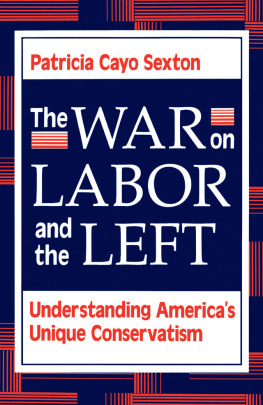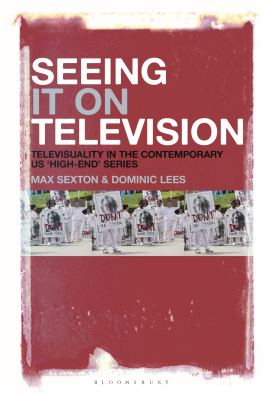The War on Labor and the Left
The War on Labor and the Left
Understanding America's Unique Conservatism
Patricia Cayo Sexton
First published 1991 by Westview Press
Published 2018 by Routledge
711 Third Avenue, New York, NY 10017, USA
2 Park Square, Milton Park, Abingdon, Oxon OX14 4RN
Routledge is an imprint of the Taylor & Francis Group, an informa business
Copyright 1991 Taylor & Francis
All rights reserved. No part of this book may be reprinted or reproduced or utilised in any form or by any electronic, mechanical, or other means, now known or hereafter invented, including photocopying and recording, or in any information storage or retrieval system, without permission in writing from the publishers.
Notice:
Product or corporate names may be trademarks or registered trademarks, and are used only for identification and explanation without intent to infringe.
Library of Congress Cataloging-in-Publication Data
Sexton, Patricia Cayo.
The war on labor and the left: understanding America's unique
conservatism / Patricia Cayo Sexton.
p. cm.
Includes bibliographical references and index.
ISBN 0-8133-1062-8.ISBN 0-8133-1063-6 (pbk.).
1. Labor movementUnited StatesHistory. 2. Trade-unions
United StatesHistory. 3. Union bustingUnited StatesHistory.
4. ConservatismUnited StatesHistory. 5. Trade-unions and
communismUnited StatesHistory. 6. CapitalismUnited States
History. I. Title.
HD8066.S44 1991
322'.2'0973dc20 91-22028
CIP
ISBN 13: 978-0-8133-1063-3 (pbk)
For Brendan Sexton and Michael Harrington in Absentia
In rereading Michael Harrington's seminal book Socialism, I came upon this inscription in the copy on my shelf: "For Brendan, Not just because you're a fine guy or because of your magnificent record as a trade unionist, but also because us Irishmen on the left have to stick together, With affection, thanks and three cheers for James Connolly.
Mike. Chicago, April 1972."
I am happy to thank, and unable to thank enough, the various colleagues, scholars, friends, and relatives who have read, with wildly varying degrees of agreement, all or part of this book during its prolonged gestation periodBrendan Sexton (father and son) and, in alphabetical order, Paul Bamberger, David Bensman, Jon Bloom, David Brody, Tom Brooks, Jacqueline Brophy, Jack Clark, Jack Conway, Bogdan Denitch, Elizabeth Durbin, Harry Fleischman, Douglas Fraser, Manny Geltman, Bill Goode, Victor Gottbaum, Lois Gray, Michael Harrington, Fred Hoehler, Irving Howe, James Jasper, Bill Kemsley, Bill Kornblum, Ira Katznelson, Mark Levinson, Seymour M. Lipset, Harry Maurer, S. M. Miller, Oscar and Dolores Paskal, Paul Schrade, Carl Shier, Charles Tilly, Gus Tyler, Daniel Walkowitz, and Dennis Wrong. Special thanks to Rita LaBonne and Tita Cooley for just being there. I am indebted and grateful to Dean Birkenkamp, a special person and a wise and congenial editor, and to the Westview staff, whose performance has surpassed anything I have found in New York.
Patricia Cayo Sexton
AMERICAN LABOR IS UNIQUE among developed democracies in two major and related respects: Its union movement is weak and declining (as measured by membership), and it lacks the kind of labor party that flourishes in almost all other democracies. A vast amount of literature, in fact, is devoted to the political uniqueness of Americaits conservatism and its singular lack of a mass labor, or social democratic, or democratic socialist party. This phenomenon has been noted even in the Wall Street Journal, where it was said that a European conservative "would be comfortable somewhere in the middle of the American Democratic party," that European leftists are "genuine socialists" with no mainstream equal in the United States, and that only 1.5 real capitalist countries exist in the worldthe United States and, after a fashion, Great Britain under Margaret Thatcher.
Countless explanations of American conservatism have been offered, most of them having to do with the presumed conservatism of American labor or that group's internal weaknesses. I will argue here, however, that although those popular views have some validity, the source of conservatism lies much less in labor than in its adversaries, in their unique corporate power and wealth and the use of those resources in waging what has been in many ways a uniquely repressive war on the "labor-left" (unions and left of center politics).
The casualties of that war mount ever higher in the current era, as do the complexity and potency of the strategies used. Historically, those strategies have included the use of private and public armed force against unionism, dominance of the mass media, the stigmatizing of much labor-left activity as "un-American," manipulation of the legal system and labor relations, control of economic policy and the globalization of the U.S. economy, and especially the heavy influence brought to bear on government policy and on a political system that is uniquely inhospitable to challenges from the labor-left. All strategies are subjects of discussion in this book.
In the past, the war has been hot, coercive, violent, and, as at present, always political. In recent decades, the violence has somewhat receded, and the war has assumed new global dimensions. Economic elites have pioneered new ways of moving capital and industry around and out of the country, and what was once a simple domestic war has been transformed into a star-wars version of the same, the casualties of which include millions of American jobs lost, usually the best jobs, union jobs, and often the unions themselves. Ousted from these "exported" jobs has been a vast army of American workers, many of them skilled and experienced people whom employers have brought in as a reserve army of permanent replacements for striking workers, thus robbing labor of its major defensive weapon, the strike. The results of these trends are broken strikes, broken unions, victories for conservatism, and further losses of labor's political influence.
The war has had few intermissions, but it has generally escalated during business recessions when employers try to drive down wages and drive out unions. Indeed, labor's adversaries become most warlike when recessions weaken their economic powers. This weakness might be expected to give labor an advantage, except that at such times, labor's bargaining powers are even weaker than those of employers and its political influenceunlike its equivalents in other democraciesis similarly weak.
Comparisons
Although it is generally believed that there has been less repression of the labor-left in the United States than in other developed democracies, the records do not bear this assumption out. In fact, they strongly suggest that the ferocity of the war in the United States has been in many ways unparalleled in the experience of comparable democracies. Cross-national comparisons, however, are both the "most valuable and most dubious way of writing history," W. D. Rubinstein writes, valuable because they illuminate events and dubious because all nations have a unique history.
Yet the riddle of America's unique conservatism conceals many secrets about the country's experience and future and invites whatever facts or speculations, comparative or otherwise, that might be brought to bear on its solution. With that invitation in mind, an inquiry into the relatively unexplored subject of repression as a feature of American conservatism is initiated in this book. The subject is one about which many volumes, perhaps libraries, could be written, and it is hoped that other people will join the search in order to confirm, deny, denounce, or supplement what is said here.











